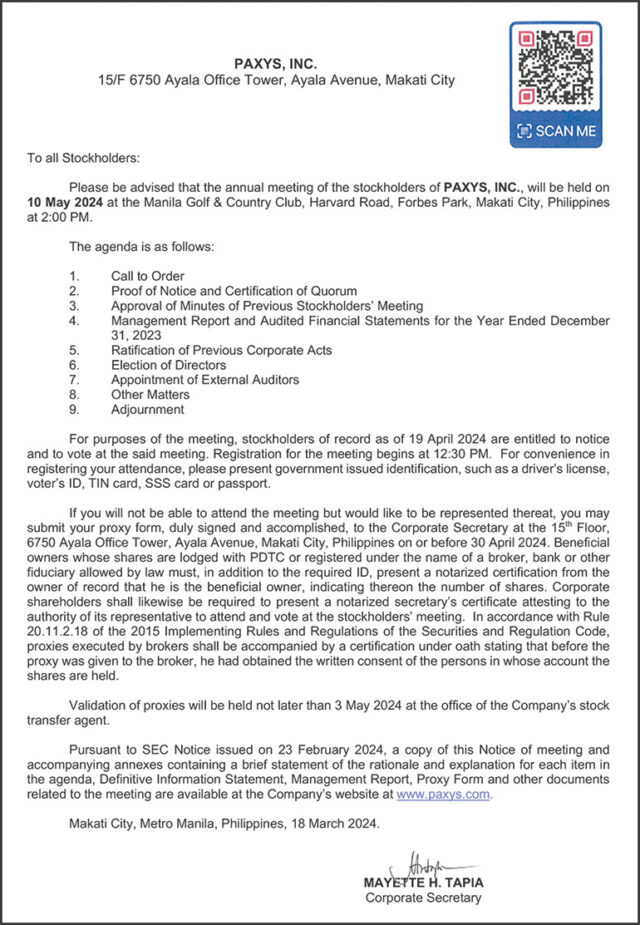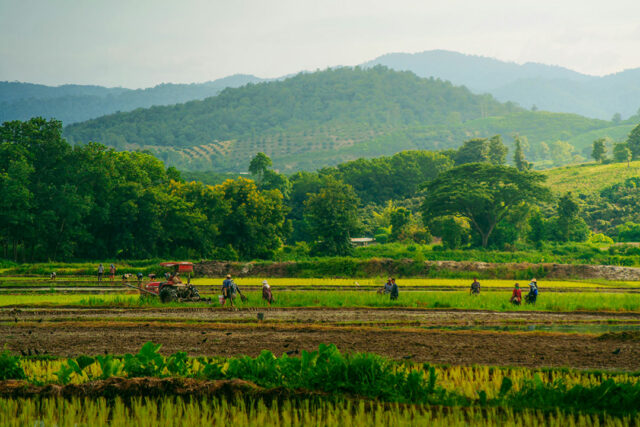BPAD in Motion stages original dances
RENOWNED professionals will be participating in a 90-minute dance showcase through BPAD in Motion, a series of performances which spotlights original choreography by Filipino ballet dancer Tony Fabella, French-Russian ballet pedagogue Marius Petipa, and Russian instructor Vasily Vainonen. The mixed bill repertoire will include compositions in ballet, contemporary dance, jazz, and street by Nina Anonas, Gia Gequinto, Madonna Tinoy, and Mycs Villoso, along with original pieces by Benilde Experimental Dance. It will focus on the artistic abilities of 37 students from the Dance Program of the Benilde School of Arts, Culture, and Performance. BPAD in Motion will be held on April 19, 6 p.m., and on April 19, 1 and 6 p.m. Shows will be at the 6F Blackbox of the Benilde Design + Arts Campus, 950 Pablo Ocampo St., Malate, Manila. Tickets are available at P350 via https://forms.gle/f6efLjvRyV8DiWP38.
Instituto Cervantes holds Día del Libro
IN celebration of the World Book Day on April 20, Dia del Libro, a one-day festival that celebrates reading, will be held at the Ayala Triangle Gardens in Makati on that day. Thousands of books will be up for grabs in the event featuring Manila’s top bookstores and publishing houses which will be selling books at a 20% discount. Following the tradition in Spain, each book purchase will come with a free rose. Visitors can also join poetry recitals, free Spanish classes, book presentations, street art, games, exhibits, storytelling sessions, Spanish food, and children’s activities. The celebration is a project of the Instituto Cervantes de Manila, the Embassy of Spain, Ayala Land, and Make it Makati. Admission to all Día del Libro activities are free on a first-come, first-served basis. For more information, visit Instituto Cervantes Manila’s Facebook page or its website: https://cultura.cervantes.es/manila/en/d%c3%ada-del-libro-2024/166509.
FEU Dance Company holds annual concert
THE FEU Dance Company (FDC) is returning with its annual dance concert titled TAMnan: Yugto ng Pag-aani this April. Set against the backdrop of agriculture and horticulture, it will take the audience through the core stages of planting, with its title inspired by the word tamnan, which means to plant something. The concert is headed by FDC artistic director Deborah Afuang, along with folkdance coach Albert Furing. Its goal is to be a celebration of individuality through dance, but also a commemoration of the power of harvesting a culture that has been planted and continuously nurtured. The show is set for April 20, 3 p.m., at the Far Eastern University (FEU) Auditorium, Manila. Tickets for the FEU Community are P100. Tickets for other guests are P150. For more information, visit: https://feudancecompany.crd.co/#register.
ArtistSpace showcases tender affections for the city
CURATED by Carlomar Arcangel Daoana and co-presented by JFRII Studio, the exhibition “Mga Liham Pag-Ibig sa Lungsod” (“Love Letters to the City”) features 28 works from artists Jowee Aguinaldo, Candice Arellano, Jonas Arlegui, RC Caringal, Rap Carloto, Kendall Colindon, Sarah Conanan, Art De Leon, Eugene Dominguez, Joseph Fraylon, Kim Gaceja, Gamalinda, Siefred Guilaran, and Mark Hernandez. The show is an ode to the shared metropolitan experience. It will be on view from April 19 to May 5 at the ArtistSpace, Ayala Museum Annex, Makati Ave. corner De La Rosa St., Greenbelt Park, Makati City.
GSIS announces 2024 National Art Competition
THE Government Service Insurance System (GSIS) has announced the start of the 19th GSIS National Art Competition 2024. The contest welcomes entries for three categories: representational, nonrepresentational (abstract), and sculpture. The GSIS will be giving cash prizes from P50,000 to P500,000 for winning entries. This year’s theme is “Bagong Pilipinas” (Rise Philippines). Eligible participants, aged 18 and above, may submit one original artwork in one category only. The deadline for submission of entries is July 6. For more details, visit the GSIS website and GSIS Museo ng Sining official Facebook page.
Alliance Française exhibits local heritage brands
FROM traditional crafts elevated with modern sophistication to innovative expressions inspired by ancient rituals, the “Heritage in Bloom” exhibition at the Alliance Française de Manille (AFM) Gallery aims to celebrate Philippine heritage and creativity. The show will have interactive displays and live demonstrations of botanical printing, spinning, and weaving, represented by three local heritage brands: Maison Métisse, Artifeks, and Kanya. The exhibit opens on April 18 and runs until May 18 at the AFM Gallery, 209 Nicanor Garcia St., Makati City.
Watch Buruguduystunstugudunstuy and dine
THOSE planning to watch Buruguduystunstugudunstuy: Ang Parokya ni Edgar Musical can pair their musical theater fix with a dining experience. Newport World Resorts is offering an exclusive Watch & Dine double feature that takes guests from the theater stage to the S Kitchen Buffet spread at Sheraton Manila Hotel inside the Newport complex. The ticket bundle is good for two buffet vouchers and two theater tickets. Prices start at P10,999 and are available at the Epic Rewards Shop website: https://shop.newportworldresorts.com/entertainment.html. The show runs from April 27 to May 7 at the Newport Performing Arts Theater in Pasay City.
CCP welcomes new trustees to its board
THE Cultural Center of the Philippines (CCP) has announced new appointments to its Board of Trustees, namely Isidro A. Consunji, Jonathan Velasco, Felix “Monino” Duque, Gizela M. Gonzalez, and Carissa Coscolluela. The new appointees will join the other trustees, namely chairman Jaime C. Laya and Junie del Mundo, who were reappointed by President Ferdinand Marcos, Jr., and interim trustees Maria Margarita Moran-Floirendo and Marivic del Pilar, to “lead the CCP in fulfilling its vision to be the leading institution for arts and culture in the Philippines,” according to the board’s official statement.
Cajipe Endaya, Comilang, Speiser at Silverlens
SILVERLENS has announced that “Rigodon,” Imelda Cajipe Endaya’s inaugural exhibition at the gallery, will be opening this April. Her abstracts from the mid-1970s will reveal a side of the artist that embraces play, experimentation, and joy, as part of her decades-long search for Filipino identity. At the same time, Silverlens will also present Stephanie Comilang and Simon Speiser’s collaborative exhibit “Piña, Why is the Sky Blue?” Previously exhibited in the UK and Canada, the exhibit is a “techno-feminist vision of a future in which ancestral knowledge and new technologies converge,” as seen in a video/virtual-reality installation and speculative documentary that features footage shot in the Philippines and Ecuador. Both shows open on April 26 and run until May 25 at the Silverlens Gallery, 2263 Don Chino Roces Ave. Extension, Makati City.
Play on religious controversy, Grace, to run in May
Playwright Floy Quintos and director Dexter M. Santos’ latest collaboration is Grace, a new play based on a religious controversy in 1948. Produced by Stella Cañete-Mendoza and Juliene Mendoza, it is based on the true story of Sr. Teresita “Teresing” Castillo, then a novice nun, who claimed that the Virgin Mother appeared to her in the convent of the Discalced Carmelites in Lipa, Batangas. The cast features Stella Cañete-Mendoza, Shamaine Centenera-Buencamino, Frances Makil-Ignacio, Missy Maramara, Matel Patayon, Leo Rialp, Dennis Marasigan, Nelsito Gomez, Jojo Cayabyab, and Raphne Catorce. Grace will run every Saturday and Sunday from May 25 to June 16, with shows at 3 and 8 p.m., at the PMCS Blackbox Theater in Circuit, Makati. Tickets are available via Ticket2Me. For inquiries, e-mail grace.spotlight.2024@gmail.com.




















